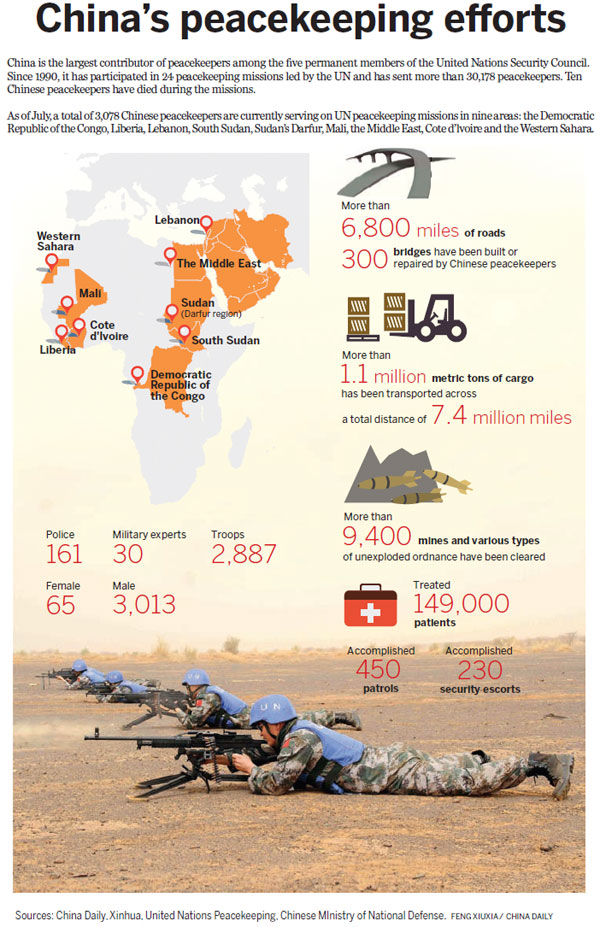
China's peacekeeping efforts have grown steadily over the past 25 years

From South Sudan to Liberia to Lebanon, Chinese personnel have been heavily involved in peacekeeping efforts for the past 25 years, honoring China's commitment to world peace, and winning applause and raising expectations in the process.
Since 1990, the country has sent over 30,000 peacekeepers to serve overseas, including 10 who lost their lives, according to the Ministry of National Defense.
"When you see that engagement from China, it means China is really concerned by the plight and the problems affecting people" in the peacekeeping mission areas, Edmond Mulet, assistant secretary-general for U.N. Department of Peacekeeping Operations, said earlier this year. "For the U.N., China's contribution is more than important; it's extraordinary," he added.
Emilio J. Cardenas, Argentina's former ambassador to the U.N., also wrote on China's peacekeeping efforts in the La Nacion newspaper, saying: "China's presence on the international stage is increasingly evident. Its leading role and influence are clearly on the rise in the most diverse corners of the globe."
China has actively participated in U.N. peacekeeping tasks since 1990, when the country sent five military observers to the U.N. Truce Supervision Organization.
Since then, personnel from several divisions under the People's Liberation Army (PLA), including soldiers and riot police, have been involved in multinational missions, such as the anti-piracy patrols in the Gulf of Aden.
On Sept. 8, China sent its 18th peacekeeping team to Liberia, this time 257 soldiers. Another team was scheduled to leave nine days later.
Shortly before the deployment, President Xi Jinping pledged to the visiting U.N. Secretary-General Ban Ki-moon that China would stick to multilateralism and strengthen the role of the U.N., advancing the organization's role in safeguarding peace and achieving development, especially in implementing the post-2015 development agenda.
According to U.N. data, 16 peacekeeping operations are currently ongoing on four continents. As of June 30, the peacekeeping workforce in the field consisted of 92,299 troops and military observers, 13,095 police officers, 5,315 foreign civilian personnel, 11,476 local civilian personnel, and 1,760 volunteers.
Lt. Col. Dai Qilin, a planning officer with the Department of Peacekeeping Operations, said peacekeeping has always been a key task for the U.N., and for the past 25 years China has played an increasingly important role.
"As we can see, China is the country that has sent the most peacekeepers among the five permanent members of the U.N. Security Council," he said.
He added that Chinese peacekeepers have brought strict discipline to the U.N., pointing out there had been no scandals or negative feedback about their work.
China sent its first guard unit to the U.N. mission in Mali in 2013. Previously, the country had sent mainly supportive peacekeeping forces, such as engineers, logistics specialists, and medics.
Zhang Junshe, a senior researcher at the PLA Naval Military Studies Research Institute, said Chinese peacekeeping forces "have made a historical leap forward" by diversifying their troops and participation in various actions.
The peacekeepers have "displayed China's speed and quality in fulfilling their duties," and have "helped to display China's image as a major country that loves peace and is proactive in participating in U.N. affairs," he said. "In a practical way, China is trying to better integrate with the world and become a guard of the international system."
China is not fighting alone, of course, as it has joined hands with peacekeepers from many other countries, while the country also puts focus on helping to improve the security situation in the mission areas.
Yang Yujun, spokesman for the Ministry of National Defense, said in June the PLA would embark on more cooperation with the U.S. in fields such as peacekeeping, and humanitarian rescue and relief.
